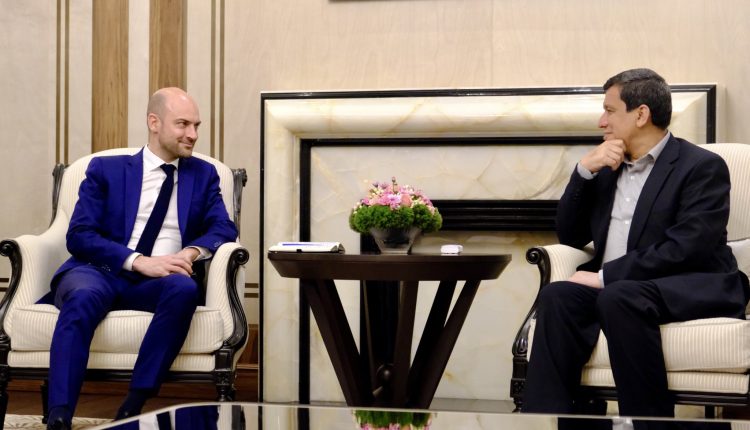French Foreign Minister Urges Full Inclusion of Kurds in Syria’s Political Transition
By Kardo Roj
QAMISHLI, Syria (North Press) – In a significant diplomatic gesture, French Foreign Minister Jean-Noël Barrot called on Thursday for the full inclusion of Kurdish rights and interests in Syria’s future political transition. The remarks came during a meeting in Erbil with Mazloum Abdi, the Commander-in-Chief of the Syrian Democratic Forces (SDF), amid growing international dialogue over the post-conflict governance of Syria.
Taking to social media platform X, Barrot described his encounter with Abdi as part of a “decade-long partnership” between France and the SDF in the enduring fight against the Islamic State (ISIS). The meeting reflects Paris’s continued engagement in supporting stability in northeast Syria, a region governed by the Autonomous Administration of North and East Syria (AANES) and secured by the SDF.
According to a statement from the SDF’s official media outlet, the high-level discussion focused on bolstering international cooperation in counterterrorism operations, maintaining regional security, and promoting inclusive political solutions. Barrot reportedly emphasized the strategic necessity of continued support for the SDF, highlighting their critical role in the defeat of ISIS and the broader stabilization of Syria.
During the meeting, both parties reiterated the importance of ensuring that all Syrian components, including Kurds and other ethnic and religious minorities, are actively involved in shaping the country’s political future. Barrot’s statement comes amid renewed calls from European diplomats for a more representative political process in Syria, particularly as talks about reconstruction and normalization gain momentum.
The French minister underscored the need to preserve gains made in the fight against ISIS and to prevent any resurgence of the extremist group. He praised the SDF not only for their military efforts but also for their role in maintaining civil order and providing governance in territories liberated from ISIS.
France has been a vocal advocate of inclusive governance in Syria, aligning itself with UN-led efforts to ensure a transition that reflects the country’s demographic diversity. Thursday’s meeting marks a continuation of this policy, with an added emphasis on support mechanisms for the AANES and its institutions.
The call for Kurdish political inclusion resonates with ongoing discussions in diplomatic circles about decentralization and local autonomy as a pathway to long-term peace. Although the Syrian government has largely resisted decentralization, Western nations including France have encouraged models that reflect local governance and community participation—principles already implemented by the AANES in northeast Syria.
Analysts note that France’s engagement with the SDF and recognition of the AANES’s governance framework positions it as a key European stakeholder in Syria’s post-war restructuring. While other actors in the conflict, such as the Turkish-backed Syrian National Army (SNA) and factions like Hayat Tahrir al-Sham (HTS), remain militarily active, their governance models and territorial ambitions continue to raise concerns among rights organizations and international observers.
Barrot’s statement adds to mounting international pressure for a political process that incorporates Syria’s diverse populations, particularly in regions that have demonstrated resilience and local governance capacity. The SDF’s ability to provide security, along with the AANES’s civilian institutions, has been increasingly cited as a stabilizing force amid continued geopolitical volatility.
As reconstruction efforts inch forward and regional actors reposition themselves, the inclusion of Kurdish voices and broader representation in Syrian political dialogue remains a litmus test for any sustainable peace. France’s reaffirmed commitment signals a growing recognition of the SDF and AANES as essential components in shaping Syria’s future.
The implications of this meeting are likely to reverberate through upcoming international forums, including UN-led negotiations and European policy deliberations. In the absence of a comprehensive peace agreement, continued support for localized governance and counterterrorism cooperation may well define the contours of Syria’s path toward recovery.

